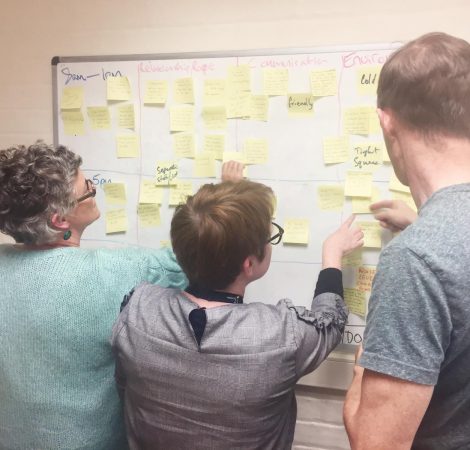Case Study
Home > Case Studies > Home Away from Home

PPI Ignite network
Home Away from Home
UCD worked with the Client Action Group of Dublin Simon to identify research priorities in relation to homelessness. Under the title ‘Home away from home’ several small projects were carried out involving clients, Dublin Simon staff and academic researchers. All projects used a design thinking approach. Project 1 developed tool for homeless clients accessing shelters for the first time; Project 2 led to the prototype of a peer-support programme in residential care and Project 3 identified solutions to provide better access to downstream services within one residential site.
The Client Action Group (CAG) operated by Dublin Simon consists of clients receiving homelessness services. The CAG advises Dublin Simon in relation to client-centred issues. ‘Home away from home’ was developed by clients during a ‘Speak Out’ meeting, which was organized and attended by approximately 50 service users. The UCD PPI team in attendance worked with clients and Dublin Simon to transform the research agenda into three distinct projects so far. On each project, the UCD PPI Team worked with a different group of clients, support workers, volunteers and staff of Dublin Simon.
The ‘Speak Out’ event was co-facilitated between the Client Action Group and Dublin Simon staff. The UCD PPI team was invited to present the idea of collaborative research and invited clients to help identify an involved research agenda. As a next step, three projects were taken forward jointly between Dublin Simon and UCD. Dublin Simon and the Client Action Group advised on which clients would be happy to work with the UCD team. All three projects involved repeated meetings, mostly in Dublin Simon premises. However, clients also made visits to UCD and participated in a seminar event.
In Project 1, the team identified the challenge of navigating shelter life in the first days of homelessness. We developed a simple communication tool using a pictorial rating scale and words to describe the new client’s feelings.
In Project 2, we introduced formally design thinking and developed in five workshops (following the Stanford D process: Empathy, Define, Ideate, Prototype, Test) a peer-support prototype. Clients used their experiences to determine the direction of the project. They were also in charge of interactive workshop elements.
Project 3 also used design thinking and involved a comprehensive observational and interview-based data collection exercise in one shelter to identify key challenges in why clients may not access downstream services. Interactive meetings led to the identification of solutions to address short- and mid-term challenges.
The communication tool developed as part of Project 1 has been ‘tested’ in two shelter sites. A formal evaluation has not been conducted. Preliminary client reports suggest high acceptability and utility of the tool. Thus far, there has been no routine implementation of the tool. Refinements may need to be considered and a reflection on how it can be used for greatest impact.
Project 2 has generated a ‘prototype’ of a peer support program. Initially, the prototype will be ‘tested’ with one peer supporter in one of Dublin Simon’s residential sites. The peer supporter will receive regular supervision from two of the residential care managers. Exploratory data on the number and nature of peer-to-peer meetings, support needs and the acceptability of the programme will be collected by the Dublin Simon team.
Project 3 has led to several potential prototypes that will be tested in the service over the coming months. The prototypes aim to improve the general awareness and accessibility of a variety of supports and services that are geared towards supporting clients to exit homelessness. The prototypes include a wide range of resources such as information sessions and drop-in clinics, an ‘exit map’ of pathways out of homelessness or through addiction services as applicable, and providing peer-led support in services.
The collaboration between Dublin Simon and the UCD PPI team has been excellent throughout. Some challenges arose due to changes in the Client Action Group. The team that was involved in organising the ‘Speak Out’ left and was replaced with a new team of clients who may have had slightly different priorities. We negotiated a compromise that would remain true to the initial speak out session and the new client priorities. Design thinking can be challenging to convey and we learned over time to explain the process by doing rather than through complex explanations. Using design thinking also allowed us to be flexible and allowed us to progress work creatively beyond academic constraints.
The COVID-19 pandemic disrupted the process, and we had to move meetings online. It also delayed the implementation of Project 2.
We are in the process of generating publications. We will share links here when available.
This work was funded by the UCD PPI Ignite programme and Dublin Simon.
Contacts
Name: Thilo Kroll
Email: thilo.kroll@ucd.ie
Research Funder(s)
Quote
The support and expertise we have gained from our partnership with UCD has been a huge asset to the organisation. The perspective and voice of our clients were at the centre of these projects, highlighting them as experts by experience. UCD and the PPI Ignite Network have given Dublin Simon a solid foundation upon which to build a framework for meaningful and impactful client engagement in our research, policy and service provision.
Michelle Connolly, Senior Research and Policy Officer, Dublin Simon Community